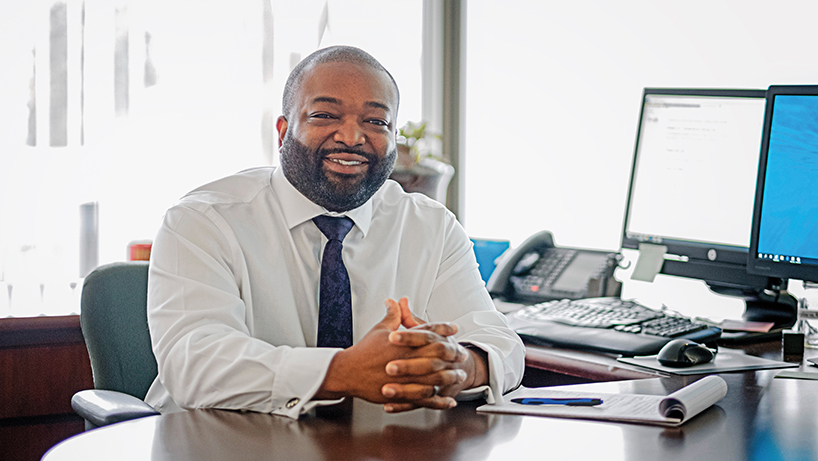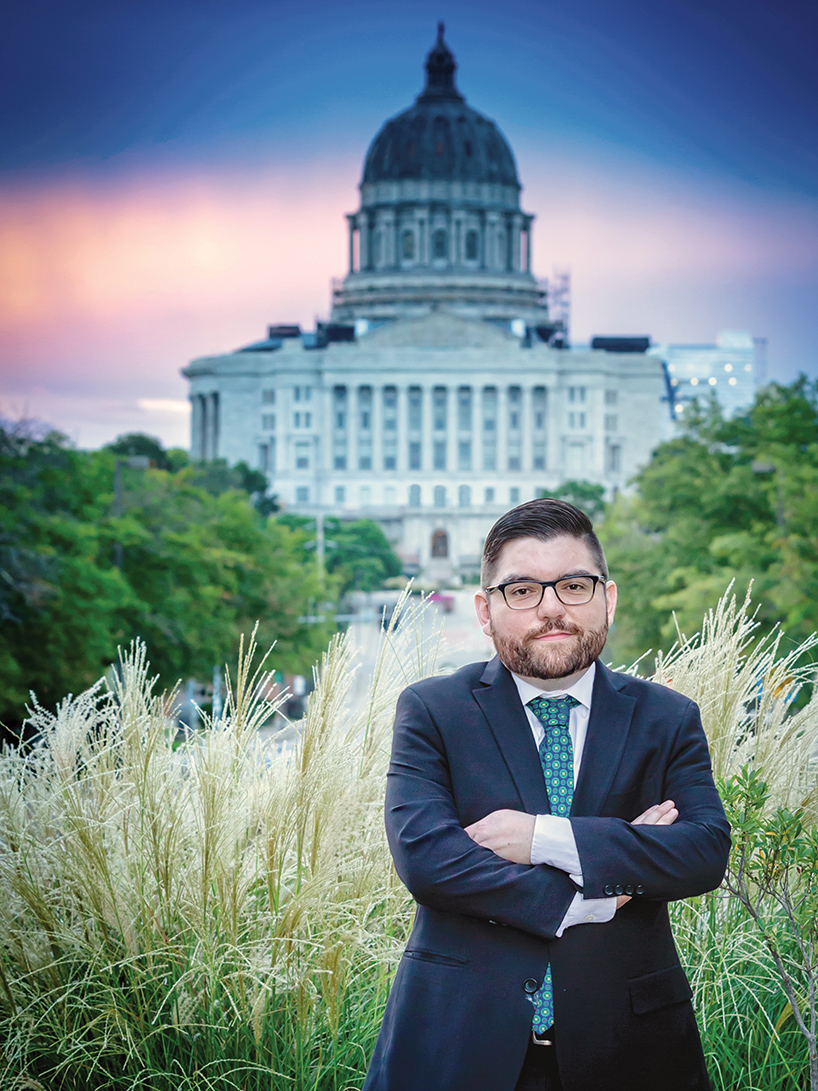
An UMSL education empowers graduates to achieve social mobility – intragenerational change bettering one’s socioeconomic status. (Illustration by Marty Baragiola)
Two years after Aaron Ezell dropped out of Purdue University to tour as a musician, he’d had enough of the music business.
He knew he had to find another direction and looked to his family for inspiration. Most relatives had working class jobs, but then there was his aunt. She’d graduated college, become a principal and was not only comfortable but also able to help the family out financially.
“I decided she was the person I wanted to be,” he says. “If college was the way that she got that done, I needed to go.”
He enrolled in the University of Missouri–St. Louis College of Business Administration and joined Delta Sigma Phi business fraternity, making a connection that led to his first job at Edward Jones where he’s now a financial advisor – a long way from college dropout.
Ezell’s rise demonstrates the power of an UMSL education to empower intragenerational change by lifting one’s socioeconomic status.
“Social mobility is doing better than the generation before me, but it is also setting an example for the generation behind me,” Ezell says. “I’ve got plenty of folks that are watching me and seeing me do things that nobody in my family has done before: traveling internationally, spending what they might consider crazy amounts of money or making investments.”
College of Business alumnus Aaron Ezell is now a financial advisor with Edward Jones. (Photo by August Jennewein)
Increasingly, college is necessary for building financial security and wealth. According to U.S. Bureau of Labor Statistics data on unemployment rates and earnings by educational attainment, people with only a high school diploma and no college degree lose out on $24,336 annually on average.
But attending college isn’t enough if students don’t graduate, preferably without much debt, and not every institution is equally equipped. In September, U.S. News & World Report released its first-ever “Top Performers on Social Mobility” based on how well universities graduate Pell Grant recipients. UMSL ranked No. 96 nationally, second in Missouri and well ahead of many universities that score high on traditional rankings based on prestige factors such as admissions rates or endowment size.
The rankings giant isn’t the first to notice that exclusive universities don’t always do right by those from lower-income backgrounds. In 2014, Harvard’s Opportunity Insights group rated how well institutions move students from the lowest fifth of the economic spectrum to the top fifth, finding that within universities mobility rates vary by access and not economic status.
UMSL succeeds in measures of social mobility partly because of who the university serves. The median family income at UMSL was $34,093 in 2017-18. But more than population, it’s because people at UMSL work hard and care deeply about creating an environment rich in access, student success and favorable outcomes.
***
Like Ezell, ArchCity Defenders lawyer Rudy Angulo took a break from school after a year and worked. When he decided to finish, he opted to save money by living at home and enrolled at UMSL.
“If there were no four-year colleges here in St. Louis, I don’t think I would have had the resources to either apply to college in Edwardsville or go back to Mizzou,” he says. “It wasn’t going to happen. I can only think of how many have taken advantage of having a four-year university here, in such a great area, that is so accessible by so many people.”
Angulo has witnessed the transformative power of education firsthand: his father immigrated from Mexico before rising through the ranks at Anheuser-Busch via hard work and a master’s degree.
“In the St. Louis area, there has been a concentration of systematic injustice,” Angulo says. “Having that level of education, being accessible by public transportation, being affordable and offering scholarships to people in the area is something that is beneficial to St. Louis.”
Access for the community is something on the minds of UMSL administrators and educators. Take the Bridge Program, which provides free college preparation for high school students and their families in the greater St. Louis area and impacts more than 4,000 individuals annually.
The effect: 100 percent of Bridge attendees enroll in college.
“They are exposed to obstacles and challenges found on a college campus, so when they hit their senior years, they’re coming out with a definitive plan, and then we connect them with support at their colleges,” says Natissia Small, the assistant provost for access and academic support who oversees Student Academic Support Services. “We’re allowing students in the St. Louis community to have a fair playing field when it comes to resources.”
Support is key for even the most-driven students. Alumna Nesmira Muratovic, retail risk and supervision oversight manager at TD Ameritrade, took advantage of the Center for Teaching and Learning’s peer-led Supplemental Instruction program for difficult classes and navigated decisions with the help of her academic advisor.
A Bosnian immigrant who came to the U.S. as a child with little, Muratovic says the thing that made her most successful was being open to opportunities. A connection from her sorority helped Muratovic land an internship and then a job at Scottrade.
“Whether it was for joining clubs or studying abroad, my goal was not, ‘I need to get a degree and to get out,’” Muratovic says. “It’s using resources and being flexible.”
Muratovic’s experience highlights what Associate Provost for Student Success Beth Eckelkamp calls cultural capital – those competencies, skills and connections that can be acquired both in or out of the classroom through experiences such as research, internships and study abroad, student organizations, leadership development opportunities, health and wellness programming and more. She thinks holistically about how to retain students and ensure they graduate within a four-to-six-year period and looks for trends among student groups, colleges, Pell-eligible students and more.
“One of the biggest stressors for low-income students is finances,” Eckelkamp says, pointing out UMSL’s efforts to create funded programs such as the Senior Degree Completion Scholarship, for students who have exhausted all financial aid options, and the Finish Your Degree Scholarship, which assists students who encounter an unanticipated roadblock in their finances.
There’s also UMSL’s tuition costs and automatic merit scholarships for first-time freshmen and transfers as well as donor- and department- funded scholarships. The university provides flexible pathways to degrees, including online or evening courses, which allow students to work while in school.
Eckelkamp and others, such as CTL Director Keeta Holmes, are thinking about how to decrease time and cost to graduation, including through a Curriculum Alignment Process that is streamlining degrees and ensuring courses are consistently offered.
“The first things that you look at are financial stress and academic support, but then you have to look broadly beyond that to campus climate, sense of belonging – all those things that impact learning,” Eckelkamp says. “We try to support students’ physiological needs. In response to food insecurity among students, Student Affairs led the efforts to run a food pantry. We have great safety officers and a comfortable campus environment, but students are still probably not going to learn to their greatest potential if they don’t feel like they belong or are valued.”
Alumna Nesmira Muratovic is a TD Ameritrade retail risk and supervision oversight manager. (Photo by August Jennewein)
One of the people working to close the opportunity gap for all at UMSL, especially first- generation, low-income or underrepresented minority students, is CTL Assistant Director Erin Whitteck. The CTL promotes student success through faculty development programs that encompass everything from designing courses to faculty learning communities.
Whitteck’s specialty is inclusive teaching practices. With no change to classroom rigor, instructors focus on ways to support students, which includes establishing and fostering a course climate that promotes belonging, setting student expectations, selecting course content that recognizes diversity and barriers to inclusion, designing courses for accessibility and reflecting on one’s own beliefs about teaching.
“We’ve all heard that some tough professors might say ‘Look to your left, look to your right, only one of you is going to be successful in this class,’” she says. “At UMSL, instead, we say, ‘We want all of you to be successful in the class, and these are the ways we have provided to you to be successful.’ Even signaling that you want students to be successful, that they belong in that class, is huge.”
***
The average starting salary of UMSL graduates – $47,000 – or the number employed full time or heading for more education – 93 percent – don’t tell the whole story of how the university fosters social mobility. There’s also the fact that more than 73 percent of UMSL graduates stay and work in the St. Louis region.
That makes a sizable network for connections, both among alumni and within the university. Take, for example, Ezell, who serves as an Alumni Association board member.
“We have a big population, a big footprint here in St. Louis and a reputation for being great workers and people,” he says. “UMSL got me prepared for real life. The education was great, and I was able to build some transferable skills for the workforce. I will be forever indebted to UMSL for giving me everything that I needed to be successful. I’m trying to pay it forward.”
This story was originally published in the spring 2020 issue of UMSLMagazine. If you have a story idea forUMSLMagazine, email magazine@umsl.edu.

















